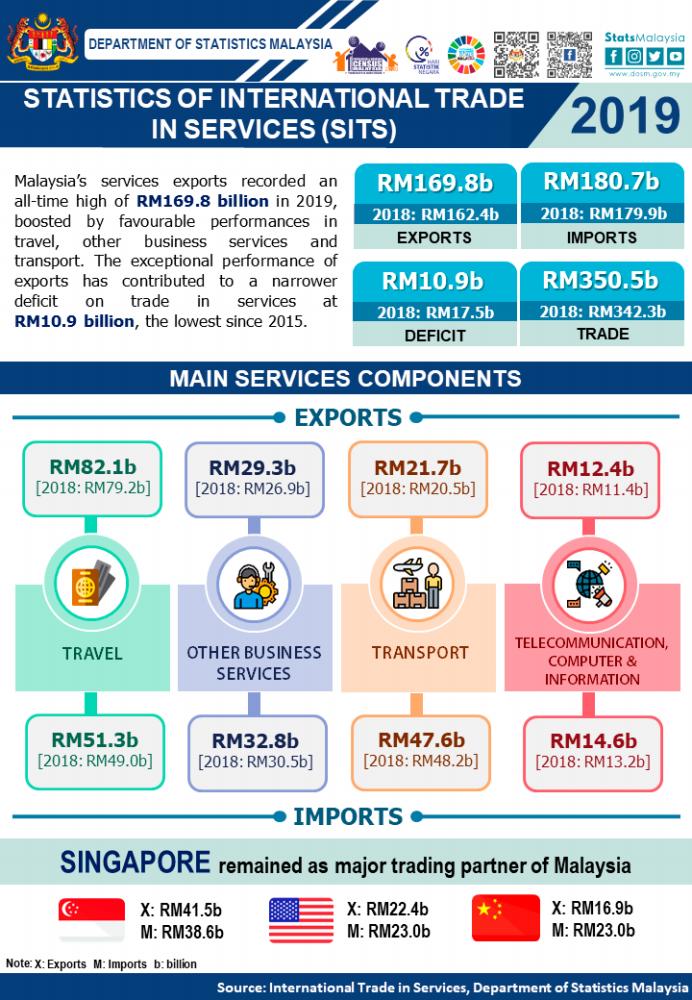PETALING JAYA: Malaysia’s services exports grew 4.6% in 2019 to reach an all-time high of RM169.8 billion, boosted by favourable performance in travel, air transport and professional services.
Meanwhile, imports increased marginally at 0.5% from RM179.9 billion in 2018 to RM180.7 billion led by outbound activities and business services. Trade balance continued to register deficit for the past eight years after registering the last surplus in 2011.
“The exceptional performance of exports and lower imports of construction activities have contributed to a narrower trade deficit in services to RM10.9 billion as against RM17.5 billion in 2018, the lowest since 2015,” said chief statistician Datuk Seri Dr Mohd Uzir Mahidin in a statement today in conjunction with the publication of the Statistics of International Trade in Services 2019.
Malaysia’s total trade in services increased to RM350.5 billion, up 2.4% against RM342.3 billion in 2018. Total trade in services made up 23.2% of gross domestic product (GDP at current prices) for 2019.
Elaborating further on the improved trade deficit in services, Uzir said travel remained as the largest component by contributing almost half of total exports with 48.4% share or RM82.1 billion. This is in line with number of tourist arrivals to Malaysia that boomed over the years to record 26.1 million in 2019, precisely from Singapore, Indonesia and China that witnessed a significant growth in tourism spending mainly on shopping, accommodation and; food and beverages.
At the same time, with the flourishing travel industry globally, there were no exception for Malaysians to travel abroad and the trend eventually becoming a lifestyle among the middle to higher income groups. Travelling abroad has also become much easier as at Sept 28, 2019, as Malaysian citizens have visa-free or visa on arrival access to 177 countries and territories. Economical flights with good connectivity across destinations also contributed for travelling abroad to be a norm among Malaysians. This has led travel abroad to expand at a faster pace from RM41.7 billion in 2015 to RM51.3 billion with an annual increase of 5.3% for the past five years.
Following the slowdown in construction activities due to completion of mega projects related to oil and gas; and civil engineering as well as the absence of new mega projects; this has caused a substantial drop in imported of construction materials and services from abroad. This scenario backed the narrowing in trade deficit of services.
The improved exports in services was also supported by the rising international air passengers with the expansion of low-cost carriers and direct flights to international routes throughout 2019 resulted in higher air transport exports of RM12.7 billion. In addition, sea transport expanded to RM7.1 billion supported by higher merchandise exports for freight.
At the same time, imports of transport decreased due to the continuous decreasing activities in freight. Overall, transport performed well and registered a lower deficit at RM25.9 billion as compared to RM27.7 billion in 2018.
Business services performed quite well in 2019 contributed by higher exports in management and consulting; architectural, engineering and technical services and accounting services.
In 2019, personal, cultural & recreational services posted a lower deficit at RM1.0 billion attributed to higher exports of RM2.4 billion. This was driven by the expansion of gaming industry to a new trend known as e-sports.
Singapore remained as the main destination for Malaysia’s exports by registering RM41.5 billion in 2019. The leading markets for travel were Singapore, China and Indonesia, while exports on manufacturing services was mainly to USA. As for India, the exports were predominantly on transport activities. In 2019, the top importing countries were from Singapore, China, US, UK and Thailand. The payments to Singapore, China and Thailand were mostly on travel while payments to US and UK were primarily for business services.
Malaysia traded with 193 countries across the world with 82 countries recorded surplus, while 111 countries displayed deficit. Over the years, Singapore has always been the top surplus contributor, however in 2019, Indonesia leapfrogged with a value of RM9.2 billion followed by India and Singapore. Meanwhile, top countries with the largest deficit were China, Thailand and UK.
“Malaysia’s international trade in services has seen a growing demand in non-traditional market segments in 2019. The emerging market of e-sports was noticeably growing in the country besides air transports, computing services and professional consulting services. With that, the country is on the right track in leveraging its international services exports by expanding supply of these services worldwide.
On the other note, Malaysia may see lower exports of services in 2020 amidst the cloud of uncertainty due to Covid-19 pandemic and the implementation of movement control order.
“All this while, Malaysia’s services exports was too concentrated on travel but with the new norm of Covid-19, the tourist and hospitality industries may severely be affected this year. Thus, diversifying and identifying the niche industries are pertinent in current scenario to withstand Malaysia’s exports of services,” said Uzir.
















